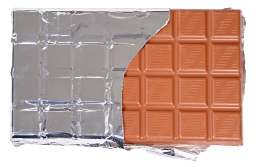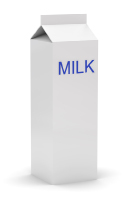Module 8
1. Module 8
1.2. Page 2
Module 8: Daily Living
Get Started

© Joss/125996/Fotolia
You are craving chocolate! You find the candy aisle and see two large bars of milk chocolate. Each bar costs $5.00, but one weighs 1 lb and the other is 480 g. You like both of the brands equally. How do you figure out which chocolate bar is the best deal?
It’s tricky to compare the chocolate bars to see which is the better deal when their weights are in different units. Do you remember how to convert between pounds and kilograms? The mental math technique that follows can be a convenient and quick way to figure out the best deal.

© appler/2670895/Fotolia
If you are home and close to the fridge, check to see if there is a 1-L container of milk or juice. Remember, the mass (weight) of a 1-L container is very close to 1 kg. Lift the container to remind yourself what a 1-kg mass feels like to pick up.

© Robert Spriggs/10048016/Fotolia
If there is a package of butter, you will probably see that it is marked as weighing 454 g. That is because, traditionally in Canada, butter was sold by the pound. One pound is equal to 454 g.
Remember,
1 lb = 453.592 368 84 . . . g
1 kg = 2.204 622 622 . . . lb
In most instances, especially when doing mental calculation in the grocery store, it is easier to use the approximation ![]()
How do you quickly convert from kilograms to pounds?
Think about butter. How many pounds of butter are in 1 kg?

© Robert Spriggs/10048016/Fotolia
In the image shown you see that 1 kg is equal to 2 lb plus 20% of a pound.
1 kg = 1 lb + 1 lb + 20% of 1 lb
1 kg = 2.2 pounds
Example 1
Approximately how many pounds are there in 15 kg?
Solution
Method 1: Calculator
Multiply by 2.2.
![]()
Method 2: Mental Calculation (without using a calculator)
To convert to pounds, you would multiply by 2.2. The calculation is simpler if you break it down into three steps.
Step 1
15 × 2 = 30 lb
You will notice this step gets you close to the calculated answer of 33 lb shown in Method 1. You could stop here and have a good estimation. To get an even better estimation, continue to Step 2.
Step 2
Find 0.2 of 15 (or 20% of 15).
Take 10% of 15. (Hint: Move the decimal to the left one place.)
10% of 15 = 1.5
Since you need 20%, double the number.
1.5 + 1.5 = 3.0
3.0 is 20% of 15.
Step 3
Add the results of Step 1 and Step 2 together.
30 + 3 = 33
![]()
Keep this in mind: 2 × number of kilograms + 0.2 × number of kilograms = 2.2 × number of kilograms.
 Self-Check
Self-Check
Use both methods from Example 1 to estimate the number of pounds in each question.
SC 1. 40 kg = ? lb
SC 2. 4.5 kg = ? lb
SC 3. 6 kg = ? lb
SC 4. 35 kg = ? lb